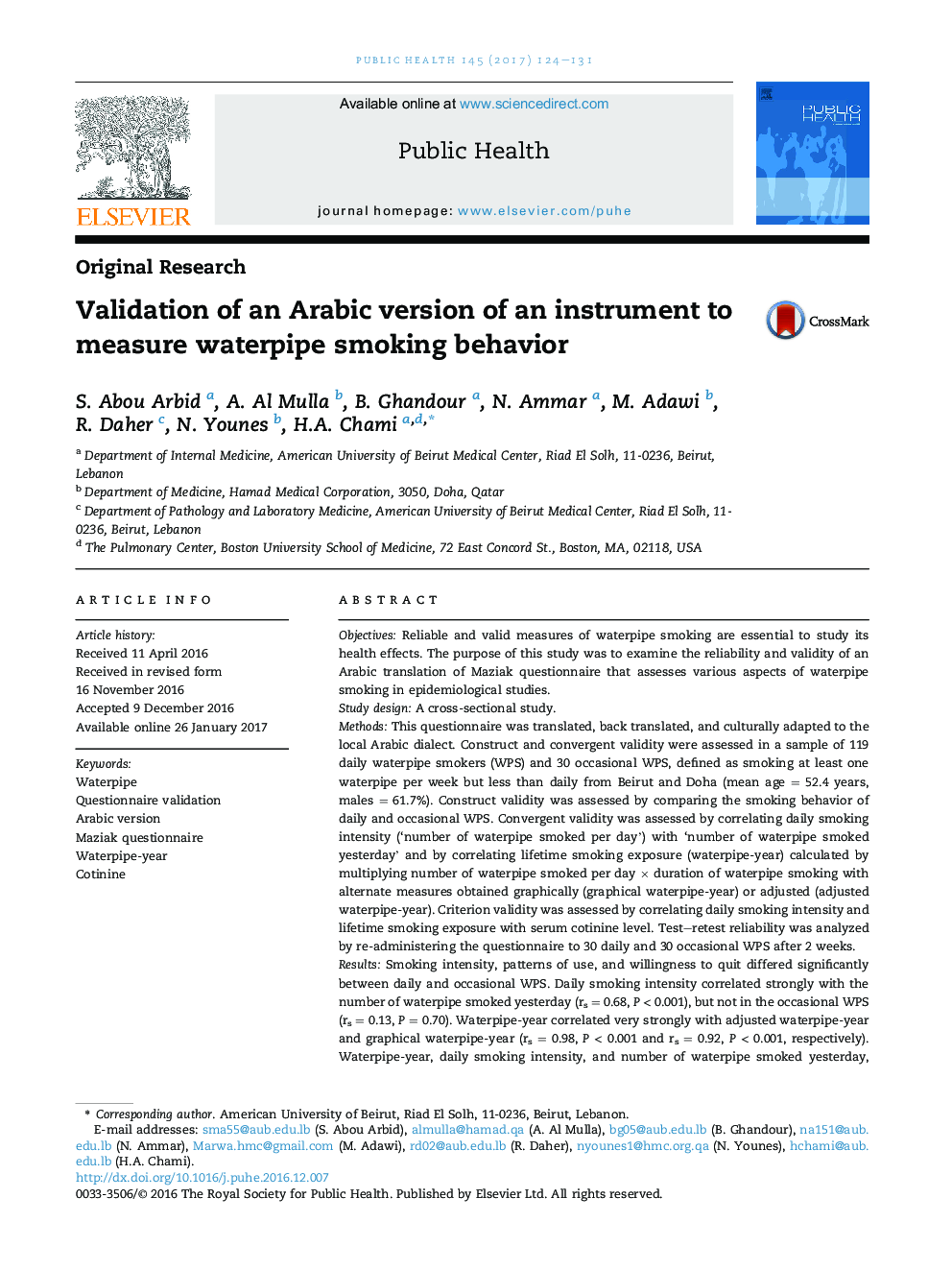| کد مقاله | کد نشریه | سال انتشار | مقاله انگلیسی | نسخه تمام متن |
|---|---|---|---|---|
| 5123026 | 1487198 | 2017 | 8 صفحه PDF | دانلود رایگان |
- The waterpipe smoking questionnaire developed by Maziak et al. (2005) has not been previously validated.
- We validated this questionnaire for assessing waterpipe use among different Arabic-speaking communities.
- Maziak questionnaire is valid and reliable for assessing waterpipe smoking patterns, intensity, and willingness to quit.
ObjectivesReliable and valid measures of waterpipe smoking are essential to study its health effects. The purpose of this study was to examine the reliability and validity of an Arabic translation of Maziak questionnaire that assesses various aspects of waterpipe smoking in epidemiological studies.Study designA cross-sectional study.MethodsThis questionnaire was translated, back translated, and culturally adapted to the local Arabic dialect. Construct and convergent validity were assessed in a sample of 119 daily waterpipe smokers (WPS) and 30 occasional WPS, defined as smoking at least one waterpipe per week but less than daily from Beirut and Doha (mean age = 52.4 years, males = 61.7%). Construct validity was assessed by comparing the smoking behavior of daily and occasional WPS. Convergent validity was assessed by correlating daily smoking intensity ('number of waterpipe smoked per day') with 'number of waterpipe smoked yesterday' and by correlating lifetime smoking exposure (waterpipe-year) calculated by multiplying number of waterpipe smoked per day Ã duration of waterpipe smoking with alternate measures obtained graphically (graphical waterpipe-year) or adjusted (adjusted waterpipe-year). Criterion validity was assessed by correlating daily smoking intensity and lifetime smoking exposure with serum cotinine level. Test-retest reliability was analyzed by re-administering the questionnaire to 30 daily and 30 occasional WPS after 2 weeks.ResultsSmoking intensity, patterns of use, and willingness to quit differed significantly between daily and occasional WPS. Daily smoking intensity correlated strongly with the number of waterpipe smoked yesterday (rs = 0.68, P < 0.001), but not in the occasional WPS (rs = 0.13, P = 0.70). Waterpipe-year correlated very strongly with adjusted waterpipe-year and graphical waterpipe-year (rs = 0.98, P < 0.001 and rs = 0.92, P < 0.001, respectively). Waterpipe-year, daily smoking intensity, and number of waterpipe smoked yesterday, correlated weakly but significantly with serum cotinine levels (rs = 0.243, P = 0.01; rs = 0.359, P < 0.01 and rs = 0.387, P < 0.01, respectively). The type and pattern of waterpipe use items showed high test-retest reliability with near perfect agreement (k > 0.9), the sharing and intention to quit waterpipe items had substantial agreement (k > 0.6), and the intent to quit item showed moderate agreement (k > 0.4).ConclusionThe questionnaire showed strong reliability, face validity, construct and convergent validity, and a weak but statistically significant criterion validity. Maziak questionnaire is valid and reliable for assessing waterpipe smoking patterns, intensity, and willingness to quit.
Journal: Public Health - Volume 145, April 2017, Pages 124-131
